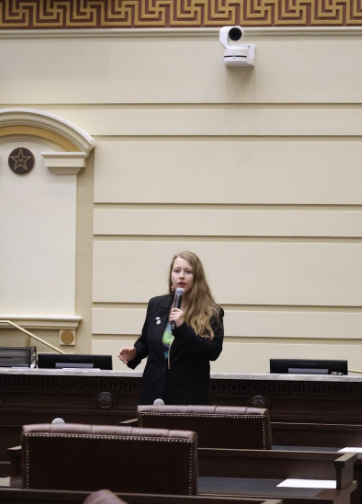By Journalist Alexandria Willard (OSU)
Oklahoma’s toll roads, like the Turner Turnpike and Will Rogers Turnpike, offer efficient routes for travelers crisscrossing the state. The tolls contribute to the maintenance and expansion of these well-maintained highways, ensuring smoother journeys for commuters and visitors alike. With various payment options and frequent service plazas offering amenities, these toll roads provide convenience amidst Oklahoma’s vast landscapes.
Oklahoma toll roads have faced criticism due to rising toll rates, causing financial strain for regular commuters. Additionally, some drivers have expressed frustration over the lack of alternative routes, leading to congestion and longer travel times. The management and transparency of toll fee allocation have also sparked debates and concerns among residents and travelers.

Bill No. SE-008, “Toll Road Maintenance” Act of 2023, written by White (SE), which was presented to the senate Friday evening, addressed these issues. She states this to be a “good compromise,” as it aims to regulate toll road management in Oklahoma by mandating a rigid 30-year budget for maintenance, limiting the use of toll revenue to specific purposes, and imposing penalties for violations. It restricts the Oklahoma Turnpike Authority (OTA) from using toll funds beyond a 30-year period, requiring public budget disclosure and prohibiting new toll projects. However, this strict structure could impede flexibility for infrastructure improvements, potentially neglecting evolving transportation needs, and the bill’s punitive measures may burden the OTA, affecting road quality and safety.
In my opinion, the proposed “Toll Road Maintenance” Act of 2023, while well-intentioned, presents several problematic aspects. Firstly, restricting the Oklahoma Turnpike Authority (OTA) and Oklahoma Department of Transportation (OTD) to a rigid 30-year budget without flexibility for unforeseen circumstances or improvements might hinder infrastructure development and maintenance.
Moreover, the stringent limitations on OTA’s use of toll funds exclusively for general revenue deposit and limited maintenance may restrict their ability to address evolving transportation needs adequately. This restriction could potentially lead to neglect of crucial infrastructure enhancements or advancements, hindering the state’s overall development and safety.
Lastly, the bill’s punitive measures, such as hefty fines for perceived violations, could impose an excessive burden on the OTA, potentially diverting resources away from essential maintenance and improvement projects, ultimately impacting the quality and safety of Oklahoma’s roads.
